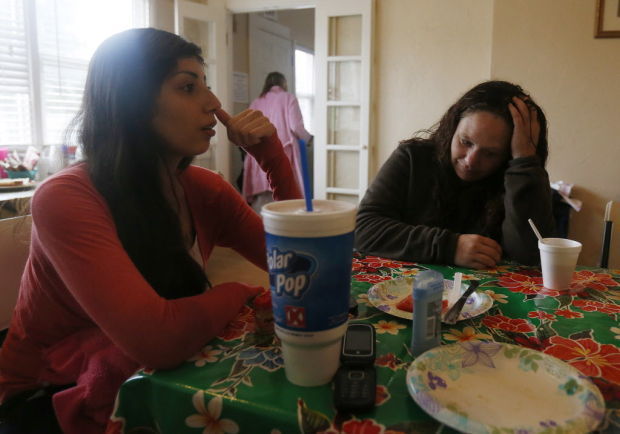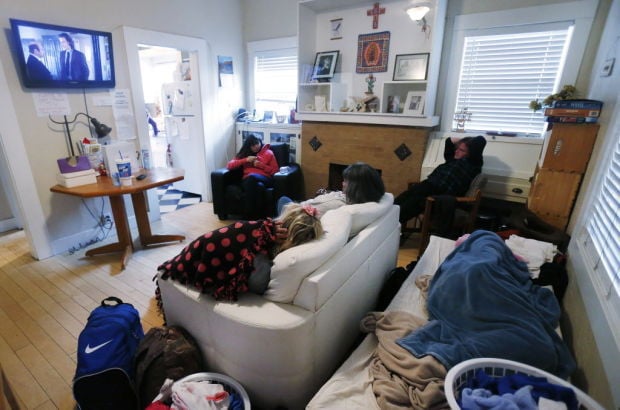Anna Brinkley doesn’t have much. She has a daughter and grandchild in Virginia. And a few possessions in storage.
At the moment, Brinkley doesn’t have a place to lay her head at night. A grassy downtown spot is where she sleeps.
But on most mornings, Brinkley makes her way to a small, fenced-in white house on West 18th Street, near where South Sixth and Stone avenues intersect. Inside its old walls, Brinkley finds refuge, respite and relief.
The house is Sister Jose Women’s Shelter.
“It keeps me going,” the 45-year-old Brinkley said. “I can come here, take a shower and make me smell good.”
Just as important, Brinkley and the other women find things inside the shelter that might seem insignificant to those outside that help sustain them on their arduous days: hugs, respect and nonjudgment.
“Just a smile makes my day,” Brinkley said.
Since it opened three years ago, the shelter has given women — single adults without children — a haven where they can find companionship and a little bit to eat. The shelter grew out of a women’s homeless program at the nearby Center City Assembly Church, organized by women from Our Mother of Sorrows Catholic parish on the east side and its pastor, Msgr. Thomas Cahalane. The program moved to 18th Street because it needed more space.
Sister Jose occupies a rental house, about 700 square feet. It can accommodate 12 women a night who sleep on cots and during the day, six days a week. Some 25 to 30 women drop in for food and showers from 9 a.m. to 2 p.m. They can use the two washing machines and hang their clothes outside to dry.
They also have a breakfast of cereal, coffee and pastries. County health regulations prohibit cooking at the shelter. The women watch television and use the phone, read or take a weekly crochet class. They leave with a sack lunch provided by Caridad Community Kitchen, a branch of the Southern Arizona Community Food Bank.
The shelter, however, needs to relocate. The lease expires in May and will not be renewed. The shelter’s supporters, Sisters Helping Sisters, have found a larger space to continue the shelter and to provide more services to more homeless women who span all racial and ethnic groups, educational levels and length of homelessness. Most receive welfare and some receive disability and all of them are without jobs.
“It’s hard to be homeless,” said Maria Brewton, 53, who has been using the shelter for years. “But it’s harder to be a homeless woman.”
There are precious few beds in Tucson for single homeless women, who often are victims of abuse and theft on the streets. Primavera Foundation, which operates a variety of shelters and services, has a nine-bed facility for single women, said Peggy Hutchison, Primavera’s chief executive.
The need for emergency shelter, however, outstrips the number of beds for all groups of homeless people.
The organizers behind Sister Jose — named after Sister Jose Hobday, a Native American spiritualist and Franciscan nun who died in Tucson in 2009 — are looking to raise $300,000 to purchase and renovate a 2,500-square-foot building on North Main Avenue, across the street from the Dunbar Cultural Center, north of downtown.
The new space would be able to accommodate 20 women overnight and up to 65 women during the day. That’s phase one. The subsequent two phases would require $200,000 more for programs and services, and maintenance, landscaping and future expansion.
Pledges and actual donations have trickled in but the shelter, which is wholly funded by donations, is facing a deadline.
The shelter has made life a bit easier for Theresa Encinas, who lives on a monthly disability check. Going to the shelter led to a sober life. She learned to sew at the shelter and learned to read through Literacy Connects.
Encinas has checked out of her homeless life and for the past five months has lived in an apartment. “This little house is a miracle,” said Encinas.
While some women have experienced life-changing transformations, it’s their daily interaction that they look forward to the most. They rely on Sister Jose for camaraderie, story sharing and information. They enjoy talking to each other and with the volunteers who are at the shelter at all hours.
“I wanted to give back the blessings my (late) husband and I had received,” said Jackie Kemp, a parishioner at Our Mother of Sorrows who has volunteered two to three days a week for the past year.
The volunteers, women who span from University of Arizona students to retirees, welcome clients. They offer assistance and conversation.
“The connections we make are powerful,” said Evie LaPointe, a 25-year-old volunteer from Madison, Wisconsin, who arrived two weeks ago. “It’s been all in.”
That’s the spirit at Sister Jose. They’re all in.
Now the women at the shelter are looking for the rest of Tucson to go all in.





